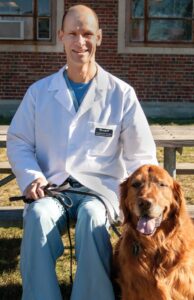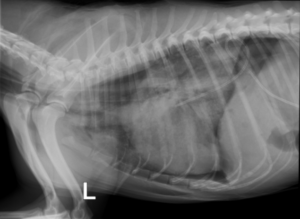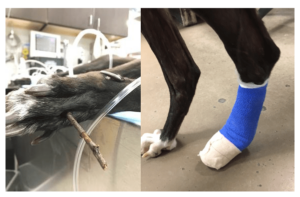-
Adopt
-
Veterinary Care
Services
Client Information
- What to Expect – Angell Boston
- Client Rights and Responsibilities
- Payments / Financial Assistance
- Pharmacy
- Client Policies
- Our Doctors
- Grief Support / Counseling
- Directions and Parking
- Helpful “How-to” Pet Care
Online Payments
Emergency: Boston
Emergency: Waltham
Poison Control Hotline
-
Programs & Resources
- Careers
-
Donate Now
 By Kiko Bracker, DVM, DACVECC
By Kiko Bracker, DVM, DACVECC
angell.org/emergency
617-522-7282
In 2013, the vetCOT (Veterinary Committee on Trauma) was established. VetCOT is a growing group of specialty hospitals that are designated as trauma centers, which have demonstrated their capacity to handle complex trauma cases 24 hours a day. VetCOT was created as a way to focus on trauma care at individual member hospitals, to emphasize the importance of trauma care within the specialty and emergency veterinary community, and to create an international data base of trauma cases that is available for retrospective research.

Thoracic radiograph of a dog that was hit by a car showing pulmonary contusions, pneumothorax, several broken ribs and a chest tube.
In 2013, nine university and private specialty hospitals were registered as the inaugural trauma centers after a rigorous qualification process. Since that time, the registry has grown to include 26 member hospitals, and it grows by about 5-8 hospitals per year. Angell became a vetCOT member hospital in 2016, in the second wave of hospital enrollment. Member hospitals must demonstrate certain emergency staffing both for doctors and for nursing staff, and emergency surgery capabilities for soft tissue, orthopedics, neurosurgery and ophthalmology. A diverse group of specialists (critical care, surgery, neurology, ophthalmology, anesthesia, cardiology, radiology, internal medicine, and dentistry) need to be on staff and available to help with the management of trauma patients. Member hospitals need to show that they have the appropriate infrastructure to support the care of trauma patients including mechanical ventilation, oxygen support, available surgical space, back-up power generator in case of loss of power, electronic medical records, specific in-hospital library resources, etc…
One of the most important aspects of being a vetCOT member hospital is a willingness to document certain information regarding trauma cases as they come to the hospital. That documentation is then uploaded into a computerized database that houses the trauma cases from all member hospitals. There are currently >25,000 individual trauma cases that have been documented in the vetCOT database since its inception in 2013. This database serves as an incredibly broad data resource that can be searched for the purpose of writing retrospective studies associated with trauma. A number of papers have already been generated using the vetCOT database as their data source, and we expect this number to grow as the number of member hospitals grows and the database contains more and more cases.
The vetCOT has hosted a yearly conference in April that takes place in Las Vegas, and is held in conjunction with the human Trauma, Critical Care & Acute Care Surgery conference. The vetCOT conference is open to the veterinary public that has an interest in trauma and trauma care. Attendees tend to be from member hospitals and hospitals that see a large number of trauma cases annually. Residents, interns and technicians are strongly encouraged to attend and to take part in discussions since they are often on the ‘front lines’ of veterinary trauma care, and their input is considered very valuable.
